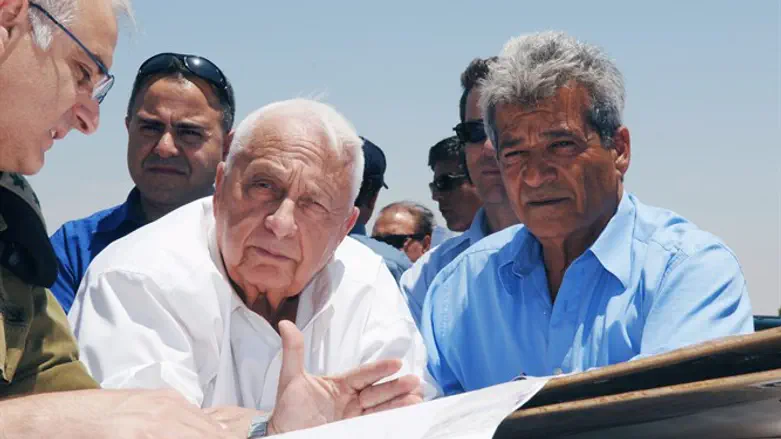
Uri Borovski was Prime Minister Ariel Sharon's advisor on Arab affairs in the period prior to the Gaza disengagement. He spoke today about the conversations that led him to retire in an interview with Arutz Sheva.
In his opening remarks, Borovski emphasized that "the relationship and joint work with Sharon was very positive, but what decided my disengagement from him was the disengagement. I didn't understand this step. I saw it as a complete mistake."
Borovski says that after realizing in conversations with others that no one really understands why Sharon adopted this move, he chose to take action and turn directly to Ariel Sharon. To do this, he used the window of time after the cabinet meetings, a period of time when he could approach the Prime Minister directly and ask him questions.
"After the ministers left for their offices the Prime Minister stayed in the office. I took this opportunity to talk. I asked him why he's doing it, as a simple question. I told him 'most of the public know I'm your advisor and naturally they ask me and ask for an answer why. A man who's about to be evicted asks the simple question of why.' We spoke in friendly language, 'Arik, people are asking why; what do I answer them?'. The Prime Minister simply didn't answer and kept quiet."
Borovski goes on to say that he did not expect such silence from someone who always knew how to answer everything: "An answer of this kind really surprised me, because we had a lot of conversations and discussions and here suddenly there's no answer at all. It gave me a hard feeling that something might be hiding here."
Is it possible to say that Arik Sharon was embarrassed in those moments? After all, it seems that Sharon and embarrassment are two opposites. Borovski replies that indeed, that was the feeling; Arik Sharon was embarrassed. "At that moment he was the man in front of me; you could call it embarrassment. He didn't answer a single answer.
"I said goodbye to him that day. It made me very angry. I thought 'what am I going to do now,' because this is an answer I didn't expect at all. Since I wanted to continue the trend to prevent this move I left the matter for the following week and again stayed after the cabinet meeting and addressed him like this: "Since last week when you didn't respond, I hope this time it'll be different. Today I have both last week's question and a suggestion," Borovski recalls.
"I gave him a five-minute lecture. I told him that if it was because of American pressure, then I bow out of getting into these things, but I'm sure if the Americans did seek to evacuate Gush Katif I believe they didn't want to see Jews there, but no one sought to demolish houses and synagogues. Therefore, as your advisor there's a proposal: We evacuate the Jews from Gush Katif but only evacuate them without touching the houses. We close the compound for seven or eight months. If after such a period the Messiah comes and there's peace in the area, I estimate that there will be those even among those who left houses behind who'll say they're willing to do it. But if it happens the other way around, we open the gates and bring the residents back."
Even in the face of this proposal, Prime Minister Ariel Sharon remained silent: "Again, silence with no response and without an answer," says Borovski, adding that in light of Sharon's silences, "all I had left to say to him at the end is that the disengagement will probably be mutual - you from Gush Katif and me from you."
Shortly afterwards he submitted his letter of resignation and since then their paths never again met. The final act of resignation was carried out by Borovski when he realized that Sharon was indeed going for the move in practice: "I saw that all this stupidity is indeed being carried out and thousands of Jews are being expelled from their homes and I realized I couldn't stay there another day. I took it very seriously. I felt hurt. I also thought 'who knows what he's going through', because Sharon is a man of many achievements and suddenly a situation arises where they don't know how to explain it."
Borovski criticizes not only Ariel Sharon as prime minister, but also Knesset Members and ministers who stood by and were silent. "It was possible to prevent this," he says, stating that if a group of MKs and ministers had stood up and said "that's enough", the move would have been halted.
He adds: "The story does not end with the catastrophe of the expulsion of the Jews from their homes. It's worse what this story brought afterwards. We cleared the way for Hamas. The one who brought Hamas here is us, and that must also be taken into account. If it hadn't been and was only a temporary expulsion, so then we made mistakes, but now we cleared space for our enemy. It's as if, from everything that's happened to us, we still don't learn lessons. We do not hear a body or person say that from now on we need to do mental arithmetic and see where we went wrong and draw lessons, both about further displacements and about the treatment of our enemies. Palestinians I talk to tell me 'Uri, we don't understand you Jews. You snatch and grab and what do you do with it? ' And I have no answer except to tell them they're right. '